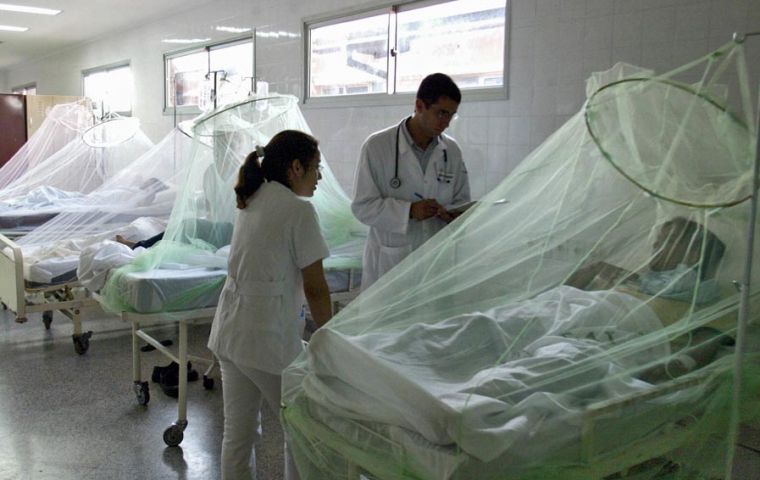MercoPress. South Atlantic News Agency
Paraguay admits that the dengue epidemic is the most severe in a decade
 Overcrowded hospitals in Asuncion attempt to addresses the current epidemics
Overcrowded hospitals in Asuncion attempt to addresses the current epidemics Paraguay’s Minister of Public Health Esperanza Martinez acknowledged on Tuesday that the current mosquito transmitted dengue epidemic is far more severe than that of 2007, considered the worst in recent times, and claimed she has had limited support from city councils
“Undoubtedly it is the worst of all”, said a frustrated Martinez when asked about the impact of the disease that so far has caused 23 reported deaths compared to 17, four years ago.
Martinez said that the situation worsened significantly because of a new dengue virus, serotype 2 and the fact so many people are sensitive to the disease for having been exposed in previous epidemics.
The minister also pointed out the lack of a coordinated effort by regional town councils, “we have structural problems that can’t be addressed and improved” underlining that councils have failed in insisting in simple sanitation campaigns in their jurisdictions.
Chief Councillors did not react on time in spite of our insistence, said the minister who complained “we all know the mosquitoes larvae reproduce in stagnant water”.
“I don’t know if I need to point a gun at them. But the president (Lugo) called them last January 8 and demanded they present and make effective an environmental plan to anticipate the disease when the rainy season begins”, revealed Martinez.
Because of this attitude in local councils, the government was unable to implement prevention plans and now must deal with contingencies, mainly insufficient logistics and such simple things as hospital beds.
So far there are over 7.000 confirmed cases of dengue in Paraguay, and another 23.000 suspected cases.
Dengue fever also known as break-bone fever is an infectious tropical disease caused by the dengue virus. Typical symptoms include fever, headache, skin rash and muscle and joint pains; in a small proportion the disease progresses to life-threatening complications such as dengue hemorrhagic fever (which may lead to severe hemorrhage) and dengue shock syndrome (where a very low blood pressure can cause organ dysfunction).
Dengue is usually transmitted by the mosquito Aedes aegypti. The virus exists in four different types, and an infection with one type usually gives lifelong immunity to that type, but only short-term immunity to the others. There is currently no available vaccine but measures to reduce the habitat and the number of mosquitoes, and limiting exposure to bites, are used to decrease the incidence of dengue.
Treatment of acute dengue is supportive, using either oral or intravenous re-hydration for mild or moderate disease, and intravenous fluids and blood transfusions for more severe cases. Dengue is currently endemic in more than 110 countries




Top Comments
Disclaimer & comment rules-

Read all commentsThe Dengue Inspectors are always around somewhere in the area (Bahia), but they are seriously hampered by the law not permitting them onto private property without permission of the owner. Thus the (many) unoccupied properties along the coastal strip of dune-slack ponds , freshwater marsh and derelict/unoccupied property are a constant source of Aedes breeding and a constant cause for concern.
Apr 13th, 2011 - 08:34 pm 0Mosquito nets are good at night in the rainy season, but for early morning/evening, exposed-body mozzie sprays are also best practice . . . . bugger, that one got me!
Good job we have a strong sea-wind here, it normally keeps the little blighters at bay.
Commenting for this story is now closed.
If you have a Facebook account, become a fan and comment on our Facebook Page!